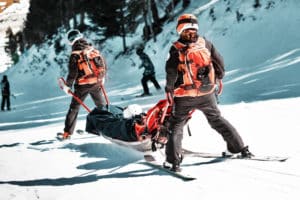
January is Winter Sports Traumatic Brain Injury Awareness Month, reminding athletes to recommit to the highest safety standards to keep your brain safe. TBI can permanently change physical abilities, mental processing, emotional regulation, behavior, motor skills, vision, hearing, and more. Winter sports, such as skiing, snowboarding, and ice skating, all have the potential to result in TBI.
Winter Sports Safety Tips
The best way to protect yourself from a TBI while participating in a winter sport is to wear a helmet. 55 percent of all extreme sports related TBIs derive from skiing and snowboarding. When participating in a downhill or backcountry experience, it is equally important to stay in bounds and remain on trails you are skilled enough to navigate. Beginners should always work on proficiencies before tackling more advanced, challenging, and dangerous routes.
In addition to staying within your skillset and using appropriate gear, taking hazards into account will reduce your risk for a winter sports related TBI. Check trail and weather conditions before you head out, especially if traveling to the backcountry. Avalanches are most common in January and February as weather conditions fluctuate. Knowing which areas to avoid and having proper training and gear will all help prevent serious injury.
What can I do if I’ve Been Injured?
States like Colorado, New Mexico, and Utah — prime winter travel spots for Oklahomans — have laws that protect ski resorts from liability following accidents. There is an accepted risk with winter sports, making safety gear and common sense the best protection. Victims are entitled to seek compensation for any related damages when an accident is caused by a third party or an injury results from gross negligence. The best way to determine if this is the case for your injury is through a free consultation at our Oklahoma City office.
The brain injury lawyers at Johnson & Biscone have decades of experience helping TBI victims receive justice and compensation. Please call us at 405-232-6490 to schedule a complimentary case review and learn how we can help you.

